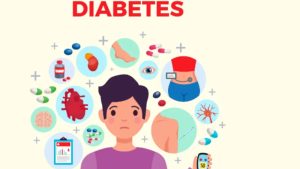
Is there a direct correlation between sugar intake and diabetes?
How does sugar intake affect the body?
This is indeed a very complex relationship
Diabetes, a condition affecting millions worldwide, is often surrounded by misconceptions, particularly concerning the role of sugar intake in its development. Contrary to popular belief, the relationship between sugar consumption and diabetes is more nuanced than a simple cause-and-effect scenario.
Also Read: Mango peel: A nutritional powerhouse or potential pitfall? Here’s what you must know
There are two primary types of diabetes: Type 1 and Type 2. Type 1 diabetes is an autoimmune disorder where the body’s immune system attacks insulin-producing cells in the pancreas. This type of diabetes is not linked to sugar intake or lifestyle factors.

Type 2 diabetes, however, is more closely associated with lifestyle choices, including diet. While excessive sugar consumption can contribute to weight gain and obesity, both of which are risk factors for Type 2 diabetes, it does not directly cause the condition.
Experts emphasize that Type 2 diabetes develops due to a combination of genetic predisposition, lifestyle factors such as diet and physical activity, and other environmental influences. Sugar intake alone does not have a direct causative link with the onset of Type 2 diabetes.
It’s crucial to dispel the myth that consuming too much sugar will inevitably lead to diabetes. Instead, adopting a balanced diet, maintaining a healthy weight, and engaging in regular physical activity are key strategies for reducing the risk of developing Type 2 diabetes and promoting overall health and well-being.

Is there a direct correlation between sugar intake and diabetes?
How does sugar intake affect the body?
This is indeed a very complex relationship
Diabetes, a condition affecting millions worldwide, is often surrounded by misconceptions, particularly concerning the role of sugar intake in its development. Contrary to popular belief, the relationship between sugar consumption and diabetes is more nuanced than a simple cause-and-effect scenario.
Also Read: Mango peel: A nutritional powerhouse or potential pitfall? Here’s what you must know
There are two primary types of diabetes: Type 1 and Type 2. Type 1 diabetes is an autoimmune disorder where the body’s immune system attacks insulin-producing cells in the pancreas. This type of diabetes is not linked to sugar intake or lifestyle factors.

Type 2 diabetes, however, is more closely associated with lifestyle choices, including diet. While excessive sugar consumption can contribute to weight gain and obesity, both of which are risk factors for Type 2 diabetes, it does not directly cause the condition.
Experts emphasize that Type 2 diabetes develops due to a combination of genetic predisposition, lifestyle factors such as diet and physical activity, and other environmental influences. Sugar intake alone does not have a direct causative link with the onset of Type 2 diabetes.
It’s crucial to dispel the myth that consuming too much sugar will inevitably lead to diabetes. Instead, adopting a balanced diet, maintaining a healthy weight, and engaging in regular physical activity are key strategies for reducing the risk of developing Type 2 diabetes and promoting overall health and well-being.
